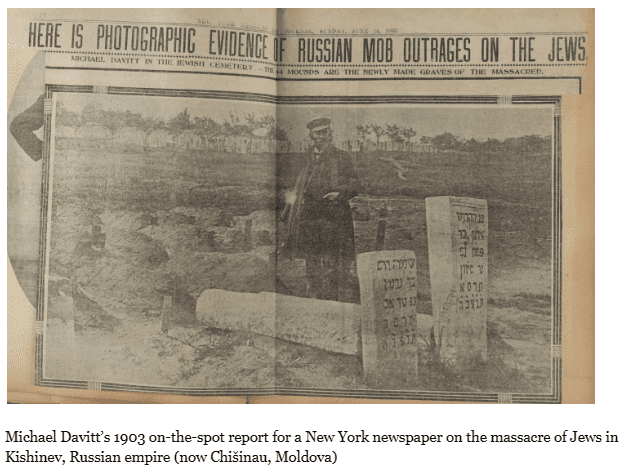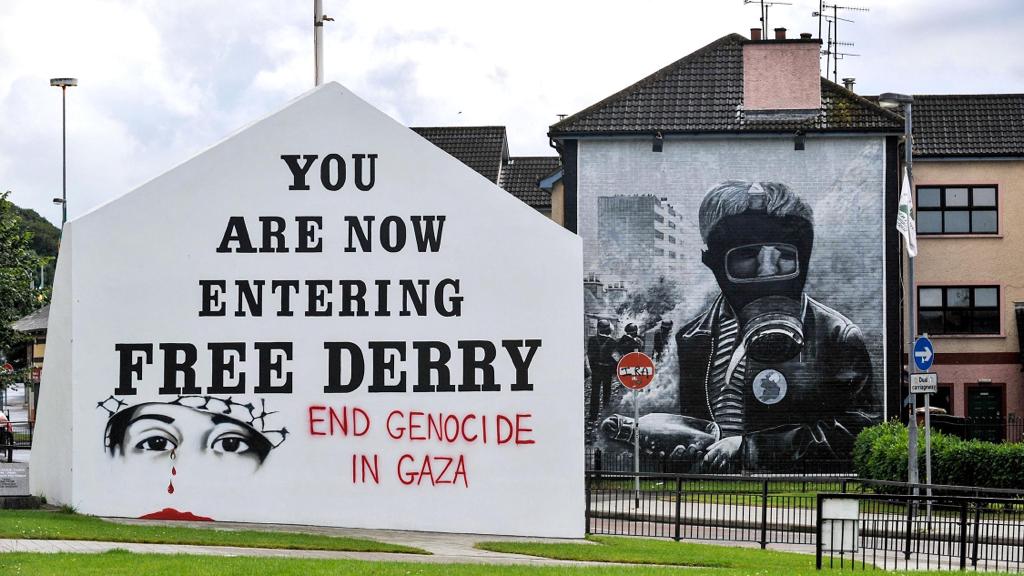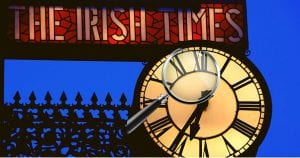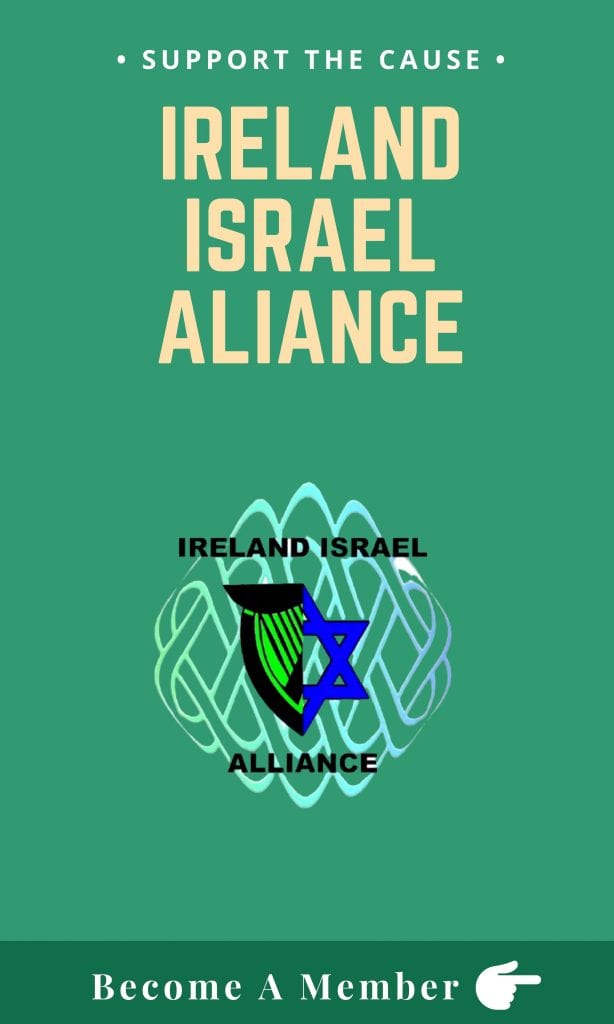In assessing the history of Ireland’s relationship with the Jewish people, past and present, nothing is simple.
It is common to read sweeping denunciations of Irish antisemitism, based on such well-known historical events as the failure of the Irish Free State to admit Jewish refugees seeking refuge from Nazi-occupied Europe in the 1930s, or Taoiseach [Prime Minister] Eamon de Valera’s visit to the German Legation in Dublin in 1945 to offer condolences on the death of Adolf Hitler.
Such ‘black mark’ episodes are frequently offset with comforting stories of individual Irish acts of kindness towards Jews or even support for their aspirations. The great 19th-century nationalist Daniel O’Connell’s inclusion of Jewish as well as Catholic emancipation in his campaign for the rights of minorities to take seats in the United Kingdom parliament, and the visit of Land League veteran Michael Davitt to the Russian empire in 1903 to publicise the details of anti-Jewish pogroms for British and American newspapers, go some way to testify to the sympathy of one people, self-viewed as oppressed, with another ‘persecuted race’.


The year-by-year record of the relationship is far more complex than either of these polarities will allow. The ambivalences are neatly satirised by James Joyce early in Ulysses, in which the antisemitic schoolmaster Mr. Deasy mocks Irish self-congratulation with an untruth of his own:
‘— I just wanted to say, he said. Ireland, they say, has the honour of being the only country which never persecuted the Jews. Do you know that? No. And do you know why?…
— Why sir? Stephen asked, beginning to smile.
— Because she never let them in, Mr. Deasy said solemnly.
A coughball of laughter leaped from his throat…’ (1)
The true complexity of the Irish-Jewish relationship is described fair-mindedly and at length in two recent publications, both well worth reading. (2) One of them, a study of nationalist press coverage of the Dreyfus affair in 1898-99, reveals that, during the second Dreyfus trial (which ended in freeing, but not exonerating, the Jewish French army captain previously convicted of treason and imprisoned on Devil’s Island) two papers of the same publishing house, the Irish Daily Independent and the Irish Weekly Independent, were voicing opposite opinions on the case!
This writer’s research for a new book surveying editorial commentary in the provincial press during Ireland’s revolutionary period (1914-23) has incidentally thrown up some passages that lift the veil on popular antisemitic prejudices of the period. (3)
First, some background. In early 1914, Home Rule (devolution) was scheduled to become law later that year. The Irish Parliamentary Party, representing nationalist Ireland at Westminster and led by John Redmond, was the undisputed political voice of the country. The majority of the provincial press supported the Party. The Kerryman was one of a few that didn’t. A strong critic of Redmond, it supported separation from the UK rather than devolution. At Easter 1916, in the midst of the Great War, a week-long armed separatist rebellion in Dublin organised by a small group of Fenian conspirators, set the country on a radically new course.
Within a month of the rebellion’s suppression, a British royal commission appointed to inquire into the causes of the rebellion issued its report. The Kerryman, which had not previously editorialised on the rebellion, claimed that a chief cause was the appointment of Sir Matthew Nathan (the under secretary appointed in 1914 to smooth the administrative path towards Home Rule) – ‘a Jew, despite the well-known dislike of Jews common among Irishmen’. (4)
Two years later, Ireland was in turmoil as the British Government proposed to extend military conscription from the rest of the United Kingdom to meet the vast losses of men at the Western Front. All nationalists were incensed. Another anti-Redmond organ, the Roscommon Herald, a paper with a wide circulation in Ireland’s midlands, had its own antisemitic conspiracy theory to explain the Government’s decision:
‘It cannot be forgotten since the Marconi scandal, that [UK prime minister] Lloyd George is in the net of a low type of Jewmen in England. It was Jewmen of that blend that left Russia prostrate and dismembered. There were just 700 Jewmen in the intrigue that brought Russia to her knees… the notorious Jewman Kerensky… his fellow Jewmen Lenin and Trotsky’. (5)
Of the three Russian leaders mentioned, only Trotsky was in fact Jewish.
The paper demonstrated further ignorance, this time of the fact that Jerusalem had had a Jewish majority for almost a century, when it gave its own slant on the epoch-making British defeat of the Ottoman Turk army and General Allenby’s entry into Jerusalem in late 1917: ‘generals and men and guns were sent from the Western front to Palestine to conquer Jerusalem for the Jews… Perhaps it is the same Jew finger that is prompting the trouble in Ireland’. (6)
Three years on, and the Anglo-Irish war had ended in a truce in July 1921. (A treaty would be negotiated by December that would lead to the establishment of the Irish Free State, though only after a ten-month civil war.) Between these two events, newspapers speculated as to the prospects of a permanent peace. A northern newspaper, the Donegal Vindicator, reckoned that it all depended on the will of international Jewish financiers. Not only were Jews ‘the power behind the throne’; they were apparently (and incredibly, in the shape of King George V) sitting on it!
Commenting on two Daily Mail stories that anticipated a settlement – one reporting that an order had been placed for 1,000 uniforms for the IRA’s Dublin brigade for the day it would come out as an official force on parade, the other concerning new investment in Dublin’s shopping district – it worked in an antisemitic theme:
‘The Jew holds the purse strings of the earth today, he orders or stops war to suit his purpose. He has done so for hundreds of years and at this moment he is the power not only behind the throne but upon it… Also members of the ONE RACE [sic] which has an unerring financial instinct have begun to make investments in Grafton Street, Dublin’s chief shopping centre, in preparation for the era of peace, which THEY FORESEE, AND HAVE, PERHAPS, TO SOME EXTENT DECREED”… The Jewish Banker decrees peace with Ireland, and if he has spoken peace it will be, no matter at what cost.’ (7)
Some of the comments presented here would be unlikely to appear in Irish mainstream media today. No respectable media editor would openly praise the country’s refusal to admit Jewish refugees or write of a general Irish ‘dislike’ of Jewish people. However, the allegations of a Jewish power to bring down governments or dictate war and peace live on in modern tropes of Jewish control of the media. Other old conspiracy theories, with their double standards and singular focus on Jews, also have modern equivalents in a different sense. We need only make one change: for ‘Jews’ substitute the Jewish state of Israel.


Thus we have a member of the US Congress, Rep. Ilhan Omar, claiming that support for Israel in US politics is ‘all about the Benjamins’, i.e. motivated solely by the power of money (‘Benjamins’ being slang for $1,000 bills and also a handy tag for Jews). It gets worse. A BBC news anchor, Anjana Gadgil, applying a standard used for no other country fighting terrorism, alleges in a recent interview that Israeli defence forces are ‘happy’ to kill Palestinian children. The examples can be multiplied.
Apologies have been issued in both of the above cases, but that hasn’t prevented them being recycled in our Dáil or Senate or in the vile and disgusting comment threads of certain online ‘journals’. The Al Jazeera school of propaganda’s myths about ‘stolen land’ and stereotyping of West Bank Jewish settlements are eagerly swallowed by too many. Sadly, we don’t have a modern Davitt willing to go and see for himself. The same mixture of prejudice, gullibility and lazy ignorance, the same lack of curiosity to find out the truth, are as evident today as they were in the pages of the Roscommon Herald a century ago.
Dermot Meleady


Notes
(1) James Joyce, Ulysses (Penguin ed. 2000), p. 44.
(2) Richard Barrett, ‘The Dreyfus Affair in the Irish Nationalist Press, 1898-1899’,
Études Irlandaises, Année 2007, 32-1, pp. 77-89; Brian Hanley, ‘Jewish people in Ireland, Britain and the US played no small part in Irish independence’, The Irish Times, 5 Apr. 2021.
(3) D. Meleady, Shifting Sentiment: Press Opinion in Ireland’s Revolutionary Decade, 1914-23 (Dublin, 2023)
(4) The Kerryman, 27 May 1916
(5) Roscommon Herald, 13 Apr. 1918
(6) Ibid.
(7) Donegal Vindicator, 7 Oct. 1921




